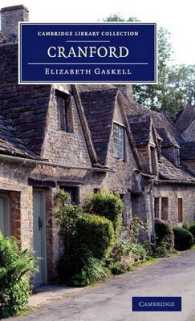- ホーム
- > 洋書
- > 英文書
- > History / World
Full Description
History, Scripture and Authority in the Carolingian Empire offers a detailed analysis of the work of the ninth-century historian Frechulf of Lisieux. It uses the creation of Frechulf's monumental Histories to explore how the past was read and interpreted in the Carolingian world.
In c. 830, Frechulf, bishop of the northwestern Frankish see of Lisieux, completed his Histories, a vast account of the world from its creation through to the seventh century. Despite the richness of the source, it has long been overlooked by modern scholars. Two factors account for this neglect: Frechulf's narrative stops over two centuries short of his time of writing, and was largely a compilation of earlier, late antique histories and chronicles. In examining Frechulf's historiographical compendium, this book challenges a dominant paradigm within medieval studies of understanding history-writing primarily as an extension of politics and power. By focusing instead on the transmission and reception of patristic knowledge, the compilation of authoritative texts, and the relationship between the study of history and scriptural exegesis, it reveals Frechulf's work to be an unexpectedly rich artefact of Carolingian intellectual culture.
Contents
Introduction
1: Frechulf and the Carolingian Culture of Compilation
2: The Truth of History
3: Re-Framing Eusebius-Jerome's Chronicle
4: Incarnation and Empire: Orosius and the Exegesis of History
5: Christiana Tempora? the Conclusion of the Histories and the Creation of a Patristic Past
6: Past and Present in the Histories
Conclusion
Index







